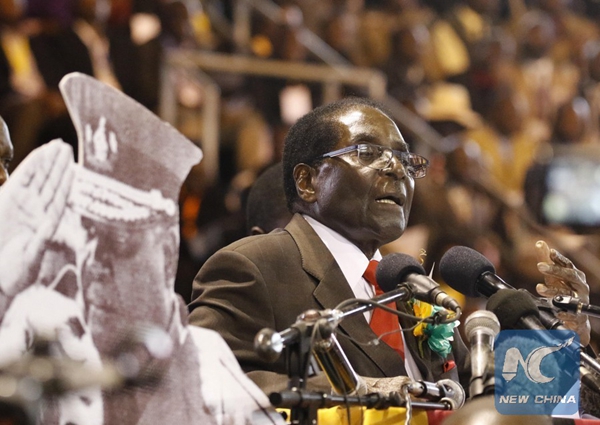The dilemma of post-Mugabe Zimbabwe
- By Earl Bousquet
 0 Comment(s)
0 Comment(s) Print
Print E-mail China.org.cn, November 23, 2017
E-mail China.org.cn, November 23, 2017
 |
The former Zimbabwean President Robert Mugabe delivers his key note address during a meeting with 10,000 liberation war veterans in Harare, Zimbabwe, April 7, 2016. [Xinhua] |
Robert Mugabe is no longer Zimbabwe's president, but that doesn't mean the end of the country's problems.
It has started new chapter in its short history of independence from colonial rule. However, even on the cusp of change, reading the constantly changing political tea leaves continues to be as difficult as ever.
The predictably unpredictable Mugabe surprised everyone by not resigning when most expected he would do so – and again by doing so when least expected.
He finally decided to walk into his political sunset, leaving those processing the change balancing on several political tightropes, and some even walking barefoot on broken glass.
The ruling ZANU-PF party insists this is "an internal affair" involving change from within. However, there's every indication the political opposition will continue doing their best to wrest the most they can from the continuing crisis.
Mugabe is gone, but big unanswered questions remain: What will the transition be like? Will the ZANU-PF continue in office until the next election? Will there be a transitional arrangement involving opposition parties? Will the rest of the world come to Zimbabwe’s aid? Will its neighbors help? Will the West intervene to influence the course of change?
Opposition spokespersons have from Day One demanded to be part of "a transitional government of national unity" to "pave the way for a return to democracy" – and that cause was championed by British Prime Minister Theresa May within hours of Mugabe's resignation on Tuesday. Western diplomats in Harare also publicly made a similar demand within hours of the army's intervention.
The African Union (AU) and the neighboring Southern African (SADC) states, taken aback as everyone else, are taking their time to compose a response.
But even with Mugabe gone, the army and the ZANU-PF still have to tread warily, as the potentially costly opposition political demands have already started snowballing in unpleasing ways.
For example, apart from insisting on "a transitional government including all parties," some major critics are also calling for such a body to comprise "only technocrats" – specifically, excluding the present contending political parties.
There are also demands that "human rights" should be an inclusive factor in the transitional arrangement being proposed, along with some demands for “prior apologies” for undemocratic acts committed under Mugabe from his former allies identified to lead the transition.
However, demands for a "Truth and Reconciliation Commission" are sure to reopen old wounds and would be opposed by those with a reason to fear what they may regard as “vengeance" or "punishment" in the name of "justice."
Zimbabweans still yearn for quick change through a peaceful process that will hopefully, sooner than later, lead to new efforts to tackle the country's dire economic problems.
All wish to restore their nation's lost pride as "the breadbasket of Southern Africa" and the African country with the most literate and the largest highly-educated population.
Yet, none of that will be either easy or immediate, as Zimbabwe will need massive external economic aid and investment, both of which are difficult global commodities to come by today.
Zimbabwe today is not like yesterday. The genie is out of the bottle and it feels like a dam has burst. The country is happy, but it's also a ticking time bomb. It's the end of an era, but there are still doubts about a new dawn. Zimbabweans are being encouraged to go forward with joy and hope, but the road ahead definitely won't be that easy.
It’s been a sad end for a legendary liberator accused of then becoming a dictator. Many Zimbabweans feel this is their "second independence" while others warn the main political players "not to add fuel to the fire" or "swap one dictator for another."
It’s much too early to predict what the future will bring for Zimbabwe. But those identified to lead the way all know their people – and the rest of the world – are watching carefully, even while dancing happily.
History is replete with examples of similar situations where popular uprisings have sometimes led to something better, but also something far worse.
It all depends on what form the transition takes, what policies are adopted in the interim and what comes out of the first national polls to be held without Mugabe – whenever they are held.
History is again in the making for Zimbabwe, but those turning the page must be alert for any element taking advantage to engage in political opportunism that will only prolong Zimbabwe's misery.
Earl Bousquet is a contributor to china.org.cn, editor-at-large of The Diplomatic Courier and author of an online regional newspaper column entitled Chronicles of a Chronic Caribbean Chronicler.
Opinion articles reflect the views of their authors, not necessarily those of China.org.cn.






Go to Forum >>0 Comment(s)